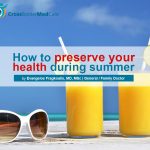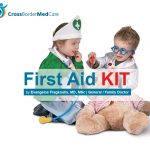
How to preserve your health during summer
Health problems can arise in our summer break and become an obstacle during holidays. Let’s see how to prevent health problems and how to deal with them if they occur.
Otitis externa- “swimmer’s ear”
In the summer, if we are lucky, we pass it by the sea or the pool. Dives in water are the main cause of otitis externa occurence. This is caused when water enters the ear canal and is trapped by the ear wax. It is accompanied by hearing loss, itching, acute pain, fluid discharge
When you get out of water, keep your ears dry. Tilt your head to the side and use your towel to absorb moisture. Do not clean your ears with cotton buds, cause its proved to make them more susceptible to infections. In case of otitis, treat pain with paracetamol or anti-inflammatories if the pain is not subsiding. On persistent or severe symptoms seek medical advice.
Vaginitis
It is well known that heat and moisture favor the growth of fungal infections. When a woman remains with a wet swimsuit after swimming, it creates the ideal conditions for the development of fungal vaginitis. Symptoms are itching and “burning” in the vagina, accompanied by vaginal secretion as “cottage cheese”.
After swimming but also after exercise with intense sweating do not stay wet. Immediately remove the wet swimsuit. Wear comfortable cotton underwear that allows the sensitive area to breathe, leaving it dry. If you develop vaginitis, use antifungal vaginal suppositories. Within three days the symptoms should retreat. If the symptoms persist, advise your doctor.
Sexually Transmitted Diseases
In summer, love is all around us and unfortunately the same happens with sexually transmitted diseases.
The only certain way to avoid sexually transmitted diseases, and an unwanted pregnancy, is abstinence from sex. When you choose to have sex, the use of good quality condoms reduces risks.
Insect bites
Mosquito, bee, snake and jelly bites often remind us that we are having our holidays in nature. An insect bite may be painful and accompanied by itching for days. It is usually harmless and rarely causes a life-threatening reaction. If you know you are seriously allergic to insect bites, you should have an adrenaline injection with you that can be life-saving.
If you are stung by an insect, carefully remove the sting, rinse the affected area with soap and water, place ice cubes wrapped in a towel for 10-20 minutes in the affected area to reduce pain and inflammation. If the bite is painful or there is swelling use, analgesics such as paracetamol and apply cream with antihistamines or hydrocortisone. You can also take an antihistamine pill to limit the bite’s reaction, especially if itching is so intense.
Western Nile Virus
In addition to local-allergic reactions, mosquito bites can transmit diseases, with the West Nile Virus being the most serious one in our country. The 20% of those infected develop mild symptoms: fever, headache, weakness, myalgia and arthralgia, vomiting, skin rashes and swollen lymph nodes. Less than 1%, mainly the elderly develop severe disease-encephalitis / meningitis, with headache, high fever, neck stiffness, apathy, disorientation, coma, tremor, convulsions, muscle weakness and paralysis.
To avoid mosquito bites wear long-sleeved clothing and trousers, avoid being out from sunset to dawn and when you go out use skin and clothing insect repellents (DEET ≥20%, IR3535, picricidin, eucalyptus essential oils, etc).
Sunburns
Sunburn occurs with painful redness of the skin after overexposure to sunlight. Sun exposure is more harmful between 10.00 and 16.00. Stay under shade (umbrella, trees etc) especially in the afternoon, wearing comfortable long-sleeved shirts and long pants, a wide-brimmed hat around the face, ears and neck, sunglasses with quality lenses that offer protection against UVA and UVB radiation. Use sunscreen with a SPF of at least 15, apply it before exposure to the sun and refresh at least every 2 hours or after swimming or sweating. These measures, in addition to sunburn, also prevent skin cancer.
If you get sunburned, make a cool shower, apply topical cold compresses and apply aloe gel or calamine lotion for moisturizing and relieving the skin. For the pain you can use paracetamol. If the burn is very painful and it is accompanied by blisters or signs of infection, advice your doctor.
Heat stroke
Heat stroke is an emergency situation where body temperature exceeds 40°C and neurological disorders occur. In heat, high humidity or intense physical exercise, the human body produces more heat than it can emit, resulting in its high temperature rise. Symptoms of heat stroke are the extremely high body temperature, red, hot, dry skin, tachycardia, headache, nausea, dizziness, confusion and fainting. It is an extremely serious condition requiring immediate medical intervention.
Avoid being out at peak temperatures hours. On days with high temperature, select air-conditioned rooms. When you go out choose comfortable, light, cotton or linen clothes. Drink plenty, cool liquids, free of alcohol, sugar or caffeine. Avoid physical exercise at high temperatures. In the event of thermal exhaustion, lower the body temperature with a cold shower or by using cold towels.
Alcohol
Moderate alcohol consumption. Remember that the effects of alcohol might be more intense if you are dehydrated. Stir with water and not with alcoholic beverages when you are thirsty. Do not swim if you have consumed alcohol.
Evangelos Fragkoulis, MD, MSc
General / Family Doctor
Vice President of the Greek Union of General Practicioners
Deputy Chief Doctor of the Journalists Health Care Fund (EDOEAP)
Scientific Associate of Bioclinic Athens

 CrossBorderMedCare is a medical care provider with facilities in Sweden and Greece. CrossBorderMedCare offers a wide spectrum of health care services that meet all the needs of an international patient ranging from urgent to planned medical and dental care.
CrossBorderMedCare is a medical care provider with facilities in Sweden and Greece. CrossBorderMedCare offers a wide spectrum of health care services that meet all the needs of an international patient ranging from urgent to planned medical and dental care. 




 Athens BioClinic Hospital is a member of Bioiatriki Healthcare Group which is the largest private medical care provider in Greece. Bioiatriki Healthcare Group owns 26 fully automated primary care Diagnostic Centers and 2 hospitals in Athens and Thessaloniki serving more than 2 million people every year.
Athens BioClinic Hospital is a member of Bioiatriki Healthcare Group which is the largest private medical care provider in Greece. Bioiatriki Healthcare Group owns 26 fully automated primary care Diagnostic Centers and 2 hospitals in Athens and Thessaloniki serving more than 2 million people every year. 



